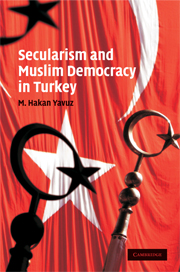Book contents
- Frontmatter
- Contents
- Preface
- Abbreviations
- Map of Turkey
- Introduction: what is an Islamic party? Is the AKP an Islamic party?
- 1 Historical and ideological background
- 2 Political and economic origins of the AKP: opportunity spaces and the backlash of February 28, 1997
- 3 Ideology, leadership and organization
- 4 Kabadayı and mağdur: Erdoğan and Gül
- 5 Modes of secularism
- 6 The Kurdish question and the AKP
- 7 The foreign policy of the AKP
- 8 The political crisis and the 2007 elections
- Conclusion: the end of dual sovereignty and the creole political language
- Bibliography
- Index
- CAMBRIDGE MIDDLE EAST STUDIES 28
4 - Kabadayı and mağdur: Erdoğan and Gül
Published online by Cambridge University Press: 05 June 2012
- Frontmatter
- Contents
- Preface
- Abbreviations
- Map of Turkey
- Introduction: what is an Islamic party? Is the AKP an Islamic party?
- 1 Historical and ideological background
- 2 Political and economic origins of the AKP: opportunity spaces and the backlash of February 28, 1997
- 3 Ideology, leadership and organization
- 4 Kabadayı and mağdur: Erdoğan and Gül
- 5 Modes of secularism
- 6 The Kurdish question and the AKP
- 7 The foreign policy of the AKP
- 8 The political crisis and the 2007 elections
- Conclusion: the end of dual sovereignty and the creole political language
- Bibliography
- Index
- CAMBRIDGE MIDDLE EAST STUDIES 28
Summary
It is important to focus on the lives and roles of these two political leaders of the AKP since the life-spans of political leaders in Turkey have always been longer than their own political parties. While Turkey is a graveyard of political parties, political leaders rarely retire and hardly die. This is very much the outcome of the personality-centric aspect of Turkish political culture. Thus, political leaders are more significant than ideologies or party programs. Leaders are likely to be turned into a Sultan and they govern their own parties as their own domain. This de-institutionalized aspect of political parties encourages us to focus on key personalities, especially Erdoğan and Gül. Moreover, oppressed or marginalized masses tend to turn “victimized” political leaders into resistance heroes. It is very important to study the biographies of Erdoğan and Gül to understand not only their reconstruction in the social memory of Anatolian people but also the meaning of what they represent for ordinary people. Moreover, the social roots, socialization and ideological evolution of the two men might open new avenues to understand the social transformation of Turkey itself. Their life stories and changing ideological positions reflect the transformation of the Islamic movement and an evolving Turkey.
When I was going from Pendik to Kartal, I asked a taxi driver what he thinks about Erdoğan. He said “Kasımpaşalı kabadayı olarak gitti, Etilerli olarak dönüyor” (He went as a kabadayı of Kasımpaşa but returned as a man of Etiler).
- Type
- Chapter
- Information
- Secularism and Muslim Democracy in Turkey , pp. 118 - 143Publisher: Cambridge University PressPrint publication year: 2009



